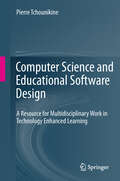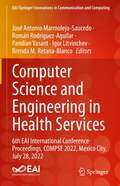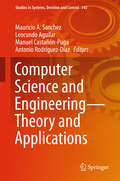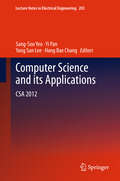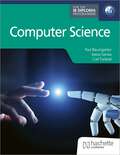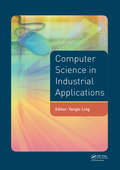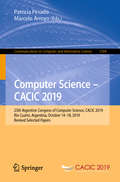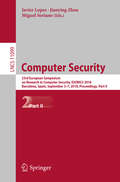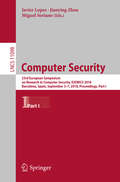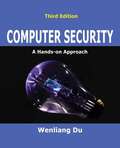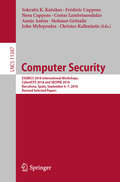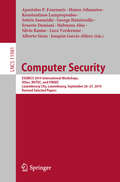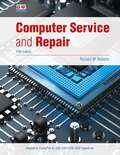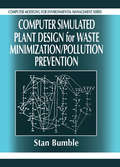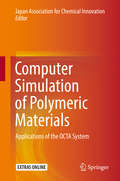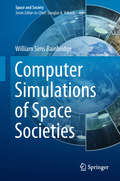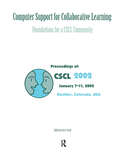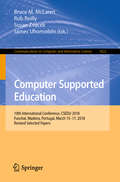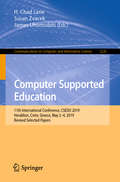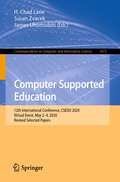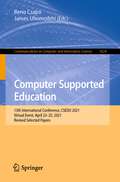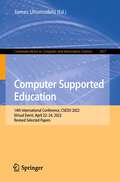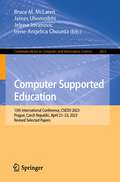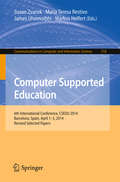- Table View
- List View
Computer Science and Educational Software Design: A Resource for Multidisciplinary Work in Technology Enhanced Learning
by Pierre TchounikineDeveloping educational software requires thinking, problematizing, representing, modeling, implementing and analyzing pedagogical objectives and issues, as well as conceptual models and software architectures. Computer scientists face the difficulty of understanding the particular issues and phenomena to be taken into account in educational software projects and of avoiding a naïve technocentered perspective. On the other hand, actors with backgrounds in human or social sciences face the difficulty of understanding software design and implementation issues, and how computer scientists engage in these tasks. Tchounikine argues that these difficulties cannot be solved by building a kind of "general theory" or "general engineering methodology" to be adopted by all actors for all projects: educational software projects may correspond to very different realities, and may be conducted within very different perspectives and with very different matters of concern. Thus the issue of understanding each others' perspectives and elaborating some common ground is to be considered in context, within the considered project or perspective. To this end, he provides the reader with a framework and means for actively taking into account the relationships between pedagogical settings and software, and for working together in a multidisciplinary way to develop educational software. His book is for actors engaged in research or development projects which require inventing, designing, adapting, implementing or analyzing educational software. The core audience is Master's and PhD students, researchers and engineers from computer science or human and social sciences (e.g., education, psychology, pedagogy, philosophy, communications or sociology) interested in the issues raised by educational software design and analysis and in the variety of perspectives that may be adopted.
Computer Science and Engineering in Health Services: 6th EAI International Conference Proceedings, COMPSE 2022, Mexico City, July 28, 2022 (EAI/Springer Innovations in Communication and Computing)
by Pandian Vasant Igor Litvinchev José Antonio Marmolejo-Saucedo Román Rodríguez-Aguilar Brenda M. Retana-BlancoThis book constitutes the refereed post-conference proceedings of the 6th EAI International Conference Computer on Science and Engineering in Health Services (COMPSE 2022), which took place in Mexico City and online, June 28th, 2022. The papers are grouped on thematic topics: application of tools delivered by the COVID-19 pandemic; health services; computer and data science; and industry 4.0 in logistics and supply chain. The content is relevant to researchers, academics, students and professionals.
Computer Science and Engineering—Theory and Applications
by Mauricio A. Sanchez Leocundo Aguilar Manuel Castañón-Puga Antonio Rodríguez-DíazThis book presents a collection of research findings and proposals on computer science and computer engineering, introducing readers to essential concepts, theories, and applications. It also shares perspectives on how cutting-edge and established methodologies and techniques can be used to obtain new and interesting results. Each chapter focuses on a specific aspect of computer science or computer engineering, such as: software engineering, complex systems, computational intelligence, embedded systems, and systems engineering. As such, the book will bring students and professionals alike up to date on key advances in these areas.
Computer Science and its Applications: CSA 2012 (Lecture Notes in Electrical Engineering #203)
by Yi Pan Hang Bae Chang Sang-Soo Yeo Yang Sun LeeThe 4th FTRA International Conference on Computer Science and its Applications (CSA-12) will be held in Jeju, Korea on November 22~25, 2012. CSA-12 will be the most comprehensive conference focused on the various aspects of advances in computer science and its applications. CSA-12 will provide an opportunity for academic and industry professionals to discuss the latest issues and progress in the area of CSA. In addition, the conference will publish high quality papers which are closely related to the various theories and practical applications in CSA. Furthermore, we expect that the conference and its publications will be a trigger for further related research and technology improvements in this important subject. CSA-12 is the next event in a series of highly successful International Conference on Computer Science and its Applications, previously held as CSA-11 (3rd Edition: Jeju, December, 2011), CSA-09 (2nd Edition: Jeju, December, 2009), and CSA-08 (1st Edition: Australia, October, 2008).
Computer Science for the IB Diploma
by Carl Turland Ioana Ganea Paul BaumgartenDeveloped in cooperation with the International Baccalaureate®Ensure students gain clarity, confidence, and an in-depth understanding to master the updated Computer Science syllabus for both Higher Level (HL) and Standard Level (SL). Closely following the structure of the revised guide, this new resource fully covers the updated assessment format and essential topics, organised by the two key themes, Concepts in Computer Science and Computational Thinking and Problem-Solving.Provide complete coverage of the latest syllabus set for first assessment in 2027 with a student-focused resource written by experienced educators and examiners. Empower students to navigate their coursework with confidence through an engaging, inquiry-based approach that emphasises conceptual understanding.Streamline your lesson planning; the unit and chapter titles match syllabus sections precisely to save you time and enhance learning efficiency. The resource also provides flexibility in choice of programming language to cater to diverse teaching and learning preferences. Support students' success with essential tools, including clear definitions of key terms, practical 'top tips,' cross-course questions, and highlights of common mistakes to avoid.Build confidence through engaging practical activities, chapter summaries, and targeted review questions that are designed to create a deep understanding of the subject matter.
Computer Science for the IB Diploma
by Carl Turland Ioana Ganea Paul BaumgartenDeveloped in cooperation with the International Baccalaureate®Ensure students gain clarity, confidence, and an in-depth understanding to master the updated Computer Science syllabus for both Higher Level (HL) and Standard Level (SL). Closely following the structure of the revised guide, this new resource fully covers the updated assessment format and essential topics, organised by the two key themes, Concepts in Computer Science and Computational Thinking and Problem-Solving.Provide complete coverage of the latest syllabus set for first assessment in 2027 with a student-focused resource written by experienced educators and examiners. Empower students to navigate their coursework with confidence through an engaging, inquiry-based approach that emphasises conceptual understanding.Streamline your lesson planning; the unit and chapter titles match syllabus sections precisely to save you time and enhance learning efficiency. The resource also provides flexibility in choice of programming language to cater to diverse teaching and learning preferences. Support students' success with essential tools, including clear definitions of key terms, practical 'top tips,' cross-course questions, and highlights of common mistakes to avoid.Build confidence through engaging practical activities, chapter summaries, and targeted review questions that are designed to create a deep understanding of the subject matter.
Computer Science in Industrial Application: Proceedings of the 2014 Pacific-Asia Workshop on Computer Science and Industrial Application (CSIA 2014), Bangkok, Thailand, November 17-18, 2014
by Yanglv LingCSIA 2014 focusses on improvements in computer science in industrial application. The contributions are grouped into five main sections:1. Computer and Information Technology.2. Business management, E-commerce and Tourism. This section covers mainly basic theory and general method of economic management businesses and market economy.&nbs
Computer Science – CACIC 2019: 25th Argentine Congress of Computer Science, CACIC 2019, Río Cuarto, Argentina, October 14–18, 2019, Revised Selected Papers (Communications in Computer and Information Science #1184)
by Patricia Pesado Marcelo ArroyoThis book constitutes revised selected papers from the 25th Argentine Congress on Computer Science, CACIC 2019, held in Río Cuarto, Argentina, in October 2019.The 27 full papers presented in this volume were carefully reviewed and selected from a total of 185 submissions. They were organized in topical sections named: intelligent agents and systems; distributed and parallel processing; computer technology applied to education; graphic computation, images and visualization; software engineering; databases and data mining; hardware architectures, networks, and operating systems; innovation in software systems; signal processing and real-time systems; computer security; innovation in computer science education; and digital governance and smart cities.
Computer Security: 14th International Conference, Isc 2011, Xi'an, China, October 26-29, 2011, Proceedings (Lecture Notes In Computer Science / Security And Cryptology Ser. #3650)
by Javier Lopez Jianying Zhou Miguel SorianoThe two-volume set, LNCS 11098 and LNCS 11099 constitutes the refereed proceedings of the 23nd European Symposium on Research in Computer Security, ESORICS 2018, held in Barcelona, Spain, in September 2018.The 56 revised full papers presented were carefully reviewed and selected from 283 submissions. The papers address issues such as software security, blockchain and machine learning, hardware security, attacks, malware and vulnerabilities, protocol security, privacy, CPS and IoT security, mobile security, database and web security, cloud security, applied crypto, multi-party computation, SDN security.
Computer Security: 14th International Conference, Isc 2011, Xi'an, China, October 26-29, 2011, Proceedings (Lecture Notes In Computer Science / Security And Cryptology Ser. #3650)
by Javier Lopez Jianying Zhou Miguel SorianoThe two-volume set, LNCS 11098 and LNCS 11099 constitutes the refereed proceedings of the 23nd European Symposium on Research in Computer Security, ESORICS 2018, held in Barcelona, Spain, in September 2018.The 56 revised full papers presented were carefully reviewed and selected from 283 submissions. The papers address issues such as software security, blockchain and machine learning, hardware security, attacks, malware and vulnerabilities, protocol security, privacy, CPS and IoT security, mobile security, database and web security, cloud security, applied crypto, multi-party computation, SDN security.
Computer Security: A Hands-on Approach
by Wenliang DuTeaching computer security principles via hands-on activities. <p><p> Unique among computer security texts, this book, in its third edition, builds on the author’s long tradition of teaching complex subjects through a hands-on approach. For each security principle, the book uses a series of hands-on activities to help explain the principle. Readers can "touch," play with, and experiment with the principle, instead of just reading about it. The hands-on activities are based on the author's widely adopted SEED Labs, which have been used by over 1000 institutes worldwide. The author has also published online courses on Udemy based on this book.
Computer Security: ESORICS 2018 International Workshops, CyberICPS 2018 and SECPRE 2018, Barcelona, Spain, September 6–7, 2018, Revised Selected Papers (Lecture Notes in Computer Science #11387)
by John Mylopoulos Frédéric Cuppens Costas Lambrinoudakis Sokratis K. Katsikas Nora Cuppens Christos Kalloniatis Annie Antón Stefanos GritzalisThis book constitutes the thoroughly refereed post-conference proceedings of the 4th International Workshop on the Security of Industrial Control Systems and Cyber-Physical Systems, CyberICPS 2018, and the Second International Workshop on Security and Privacy Requirements Engineering, SECPRE 2018, held in Barcelona, Spain, in September 2018, in conjunction with the 23rd European Symposium on Research in Computer Security, ESORICS 2018. The CyberICPS Workshop received 15 submissions from which 8 full papers were selected for presentation. They cover topics related to threats, vulnerabilities and risks that cyber-physical systems and industrial control systems face; cyber attacks that may be launched against such systems; and ways of detecting and responding to such attacks. From the SECPRE Workshop 5 full papers out of 11 submissions are included. The selected papers deal with aspects of security and privacy requirements assurance and evaluation; and security requirements elicitation and modelling.
Computer Security: ESORICS 2019 International Workshops, IOSec, MSTEC, and FINSEC, Luxembourg City, Luxembourg, September 26–27, 2019, Revised Selected Papers (Lecture Notes in Computer Science #11981)
by Joaquin Garcia-Alfaro Silvio Ranise Ernesto Damiani Sotiris Ioannidis Apostolos P. Fournaris Konstantinos Lampropoulos Manos Athanatos George Hatzivasilis Habtamu Abie Luca Verderame Alberto SienaThis book constitutes the refereed post-conference proceedings of the Second International Workshop on Information & Operational Technology (IT & OT) security systems, IOSec 2019 , the First International Workshop on Model-driven Simulation and Training Environments, MSTEC 2019, and the First International Workshop on Security for Financial Critical Infrastructures and Services, FINSEC 2019, held in Luxembourg City, Luxembourg, in September 2019, in conjunction with the 24th European Symposium on Research in Computer Security, ESORICS 2019. The IOSec Workshop received 17 submissions from which 7 full papers were selected for presentation. They cover topics related to security architectures and frameworks for enterprises, SMEs, public administration or critical infrastructures, threat models for IT & OT systems and communication networks, cyber-threat detection, classification and pro ling, incident management, security training and awareness, risk assessment safety and security, hardware security, cryptographic engineering, secure software development, malicious code analysis as well as security testing platforms. From the MSTEC Workshop 7 full papers out of 15 submissions are included. The selected papers deal focus on the verification and validation (V&V) process, which provides the operational community with confidence in knowing that cyber models represent the real world, and discuss how defense training may benefit from cyber models. The FINSEC Workshop received 8 submissions from which 3 full papers and 1 short paper were accepted for publication. The papers reflect the objective to rethink cyber-security in the light of latest technology developments (e.g., FinTech, cloud computing, blockchain, BigData, AI, Internet-of-Things (IoT), mobile-first services, mobile payments).
Computer Simulated Plant Design for Waste Minimization/Pollution Prevention (Computer Modeling for Environmental Management)
by Stan BumbleFull of examples based on case studies from a variety of industries, Computer Simulated Plant Design for Waste Minimization/Pollution Prevention discusses preventing pollution and minimizing waste using computer simulation programs. The author examines the computer technologies used in the field, including the design and analysis of computer-aided flow sheets. With this book, readers will understand how to use computer technology to design plants that generate little or no pollution and how to use information generated by computer simulations for technical data in proposals and presentations and as the basis for making policy decisions.
Computer Simulation of Polymeric Materials: Applications of the OCTA System
by Japan Association for Chemical InnovationThis book is the first to introduce a mesoscale polymer simulation system called OCTA. With its name derived from "Open Computational Tool for Advanced material technology," OCTA is a unique software product, available without charge, that was developed in a project funded by Japanese government. OCTA contains a series of simulation programs focused on mesoscale simulation of the soft matter COGNAC, SUSHI, PASTA, NAPLES, MUFFIN, and KAPSEL. When mesoscale polymer simulation is performed, one may encounter many difficulties that this book will help to overcome. The book not only introduces the theoretical background and functions of each simulation engine, it also provides many examples of the practical applications of the OCTA system. Those examples include predicting mechanical properties of plastic and rubber, morphology formation of polymer blends and composites, the micelle structure of surfactants, and optical properties of polymer films. This volume is strongly recommended as a valuable resource for both academic and industrial researchers who work in polymer simulation.
Computer Simulations of Space Societies (Space and Society)
by William Sims BainbridgeAt the intersection of astronautics, computer science, and social science, this book introduces the challenges and insights associated with computer simulation of human society in outer space, and of the dynamics of terrestrial enthusiasm for space exploration. Never before have so many dynamic representations of space-related social systems existed, some deeply analyzing the logical implications of social-scientific theories, and others open for experience by the general public as computer-generated virtual worlds. Fascinating software ranges from multi-agent artificial intelligence models of civilization, to space-oriented massively multiplayer online games, to educational programs suitable for schools or even for the world's space exploration agencies. At the present time, when actual forays by humans into space are scarce, computer simulations of space societies are an excellent way to prepare for a renaissance of exploration beyond the bounds of Earth.
Computer Support for Collaborative Learning: Foundations for A Cscl Community (cscl 2002 Proceedings)
by Gerry StahlComputer Support for Collaborative Learning (CSCL) is a field of study centrally concerned with meaning and the practices of meaning-making in the context of joint activity, and the ways in which these practices are mediated through designed artifacts. This volume includes abstracts of papers that were presented during interactive poster sessions at CSCL 2002. Documenting an extremely heterogeneous, productive phase of inquiry with broad social consequences, these proceedings reflect the current state of CSCL research--particularly in North America and Western Europe.
Computer Supported Education: 10th International Conference, CSEDU 2018, Funchal, Madeira, Portugal, March 15–17, 2018, Revised Selected Papers (Communications in Computer and Information Science #1022)
by Susan Zvacek James Uhomoibhi Bruce M. McLaren Rob ReillyThis book constitutes the thoroughly refereed proceedings of the 9th International Conference on Computer Supported Education, CSEDU 2018, held in Funchal, Madeira, Portugal, in March 2018. The 27 revised full papers were carefully reviewed and selected from 193 submissions. The papers deal with the following topics: new educational environments, best practices and case studies of innovative technology-based learning strategies, institutional policies on computer-supported education including open and distance education.
Computer Supported Education: 11th International Conference, CSEDU 2019, Heraklion, Crete, Greece, May 2-4, 2019, Revised Selected Papers (Communications in Computer and Information Science #1220)
by Susan Zvacek James Uhomoibhi H. Chad LaneThis book constitutes the thoroughly refereed proceedings of the 11th International Conference on Computer Supported Education, CSEDU 2019, held in Heraklion, Crete, Greece, in May 2019. The 30 revised full papers were carefully reviewed and selected from 202 submissions. The papers cover wide research fields including authoring tools and content development, AV-communication and multimedia, classroom management, e-Learning hardware and software, blended learning, critical success factors in distance learning.
Computer Supported Education: 12th International Conference, CSEDU 2020, Virtual Event, May 2–4, 2020, Revised Selected Papers (Communications in Computer and Information Science #1473)
by Susan Zvacek James Uhomoibhi H. Chad LaneThis book constitutes selected, revised and extended papers from the 12th International Conference on Computer Supported Education, CSEDU 2020, held as a virtual event in May 2020. The 25 revised full papers were carefully reviewed and selected from 190 submissions. The presented papers contribute to the understanding of relevant trends of current research on Computer Supported Education, including learning analytics, intelligent tutoring systems, virtual and augmented reality, MOOCs, and automated assessment systems.
Computer Supported Education: 13th International Conference, CSEDU 2021, Virtual Event, April 23–25, 2021, Revised Selected Papers (Communications in Computer and Information Science #1624)
by James Uhomoibhi Beno CsapóThis book constitutes selected, revised and extended papers from the 13th International Conference on Computer Supported Education, CSEDU 2021, held as a virtual event in April 2021.The 27 revised full papers were carefully reviewed and selected from 143 submissions. They were organized in topical sections as follows: artificial intelligence in education; information technologies supporting learning; learning/teaching methodologies and assessment; social context and learning environments; ubiquitous learning; current topics.
Computer Supported Education: 14th International Conference, CSEDU 2022, Virtual Event, April 22–24, 2022, Revised Selected Papers (Communications in Computer and Information Science #1817)
by James UhomoibhiThis book constitutes the refereed post-proceedings of the 14th International Conference on Computer Supported Education, CSEDU 2022, Virtual Event, April 22–24, 2022. The conference was held virtually due to the COVID-19 crisis.The 8 full papers included in this book were carefully reviewed and selected from 181 submissions. The papers included in CSEDU 2022 proceedings contribute to the understanding of relevant trends of current research on Computer Supported Education, including: Emerging Technologies in Education for Sustainable Development, Instructional Design, Pre-K/K-12 Education, Machine Learning, Learning with AI Systems, Higher Order Thinking Skills, Game-Based and Simulation-Based Learning, Educational Data Mining, Course Design and eLearning Curriculae and Constructivism and Social Constructivism.
Computer Supported Education: 15th International Conference, CSEDU 2023, Prague, Czech Republic, April 21–23, 2023, Revised Selected Papers (Communications in Computer and Information Science #2052)
by James Uhomoibhi Bruce M. McLaren Irene-Angelica Chounta Jelena JovanovicThis book constitutes revised selected papers from the 15th International Conference on Computer Supported Education, CSEDU 2023, which took place in Prague, Czech Republic, during April 21–23, 2023.CSEDU 2023 accepted 34 full and 54 papers out of 162 papers submissions. Out of these, 8 contributions have been selected for inclusion in this book. The papers included in this book contribute to the understanding of relevant trends in the current research on Computer Supported Education, with a particular focus on: eLearning Platforms, Portals, Feedback and Learning Support, Game-Based and Simulation-Based Learning, Active Learning, Tools to Assess Learning, Learning with AI Systems, Higher Order Thinking Skills, Flipped Classroom, Faculty Development and Constructivism and Social Constructivism.
Computer Supported Education: 6th International Conference, CSEDU 2014, Barcelona, Spain, April 1-3, 2014, Revised Selected Papers (Communications in Computer and Information Science #510)
by Susan Zvacek Markus Helfert Maria Teresa Restivo James UhomoibhiThis book constitutes the refereed proceedings of the 6th International Conference on Computer Supported Education, CSEDU 2014, held in Barcelona, Spain, in April 2014. The 24 revised full papers presented were carefully reviewed and selected from 242 submissions. The papers address topics such as information technologies supporting learning; learning/teaching methodologies and assessment; social context and learning environments; domain applications and case studies; and ubiquitous learning.
